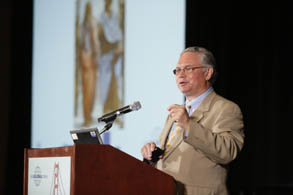
If a SAS Global Forum presentation doesn’t include at least one line of code, is it still a presentation?
Absolutely. Just ask those who donned their thinking caps to hear J. Michael Hardin, Dean and Professor of Statistics from Culverhouse College of Commerce and Business Administration at the University of Alabama. Hardin offered fair warning that his 90-minute talk and slide deck included no code, only one equation and more pictures than words.
“I want to challenge you to think more deeply about some of the underlying assumptions that are taken for granted when we analyze data,” he said.
Hardin referenced the perspectives of early and late-day philosophers and scientists, including Aristotle, Plato, Galileo, Newton, Pearson, Einstein and Mulaik, to help audience members better understand some of the confusion surrounding big data and business analytics. “I feel that statistics needs philosophical thinking rather desperately, and the philosophy of knowledge needs statistics,” he said.
Highlights and more zinger quotes from Hardin's presentation follow:
- Years ago, a statistician might have claimed that statistics deals with the processing of data. Today’s statistician is more likely to say that statistics is concerned with decision making in the face of uncertainty.
- The emphasis today is on prediction, not as much on estimation. In this new world, hypothesis may not be needed.
- If you have a model that explains everything, have you gotten to the truth? Hardin highlighted the perspectives of Plato vs. Aristotle and the existence of chairs vs. “chairness” to illustrate the challenges faced in considering various forms of data modeling and decision-making.
- Hardin quoted American analytic philosopher Charles Stevenson: “One would not expect a book on scientific method to do the work of science itself…The purpose of an analytic or methodological study is always indirect. It hopes to send others to their task with clearer heads and less wasteful habits of investigation. This necessitates a continual scrutiny of what these others are doing, or else analysis of meanings proceeds in a vacuum.”
- No philosophical theory of science for statistics is without its problems or criticisms.
For an enlightening view of statistical thinking, be sure to view the archive video of Hardin’s presentation.
